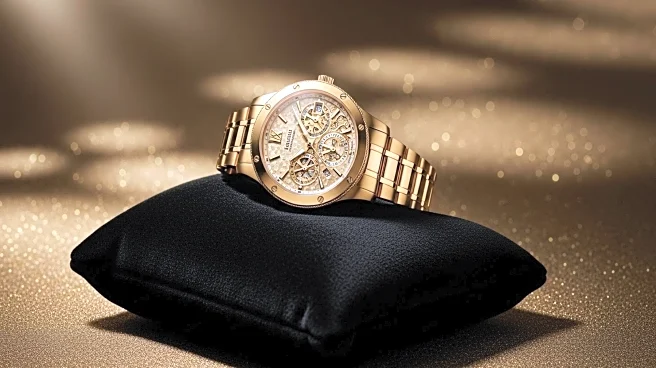What is the story about?
What's Happening?
LVMH, the world's largest luxury conglomerate, is experiencing significant pressure on its profit margins due to the doubling of gold prices over the past two years, compounded by U.S. tariffs and a weaker dollar. These factors have made it increasingly difficult for high-end goods companies like LVMH to maintain their gross margins. Gold prices have surged above $4,000 an ounce, driven by investor demand for safe assets amid economic and geopolitical uncertainties, as well as expectations of further U.S. interest rate cuts. As a result, LVMH and other luxury brands are likely to implement gradual price hikes to offset these pressures. The company is expected to report flat third-quarter sales, with declines in fashion and leather goods, but slight growth in watches and jewelry.
Why It's Important?
The rising gold prices and tariffs present a significant challenge for the luxury goods industry, particularly for companies like LVMH that rely heavily on jewelry sales. Gold represents a small portion of input costs for luxury jewelry brands, but the overall impact on profit margins is substantial. As brands consider passing these cost increases to consumers, they risk eroding demand, which could affect their market position and financial performance. The situation highlights the vulnerability of luxury brands to external economic factors and the need for strategic pricing decisions to maintain profitability. This development could lead to broader implications for the luxury market, influencing consumer behavior and competitive dynamics.
What's Next?
LVMH and other luxury brands may need to carefully navigate the balance between maintaining profit margins and consumer demand. Analysts suggest that even modest retail price increases could address the material gold price hikes, but caution is needed to avoid deterring shoppers. The company is set to report its third-quarter sales soon, which will provide further insights into how these economic pressures are affecting its performance. Additionally, the luxury industry may see shifts in strategy as brands adapt to these challenges, potentially influencing product offerings and marketing approaches.
Beyond the Headlines
The current economic pressures on LVMH and similar companies underscore the broader impact of geopolitical and economic uncertainties on global industries. The luxury sector, often seen as resilient, is not immune to these challenges, which could lead to long-term shifts in consumer preferences and industry practices. The situation also raises questions about the sustainability of luxury brands' reliance on precious materials and the potential for innovation in sourcing and production to mitigate such risks.

















